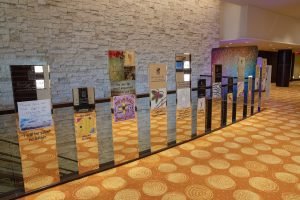A few days before the gala, I was fortunate to hear Sally Field read and discuss her memoir In Pieces. Sally spoke about her writing process; she talked about reflecting on her life and seeing the pieces – lining them up to examine them – and putting them back together to see her life anew, and in some ways differently than before. I appreciated her observation that putting the pieces together does not necessarily mean we are fixed or complete or perfect. Putting the pieces together illuminates our full – and still flawed – self, and offers an opportunity for us to understand how we come to our life each day.
 Looking back might be about celebrating, or it might be about learning, or maybe it’s about letting go. Sometimes we look back to help us figure out how to look, and even move, forward. We can reflect on things we have said or done and see the choices we made as part of our identity. And, we act and choose based on who we are, for we grow into ourselves because of our experiences and choices.
Looking back might be about celebrating, or it might be about learning, or maybe it’s about letting go. Sometimes we look back to help us figure out how to look, and even move, forward. We can reflect on things we have said or done and see the choices we made as part of our identity. And, we act and choose based on who we are, for we grow into ourselves because of our experiences and choices.
Sometimes it can be hard to reflect and see things that no longer make us happy or proud. Sometimes it can be empowering to reflect and realize that something no longer makes us feel sad or diminished. It can take courage to reflect – and even more to learn from looking back, to admit a mistake, to take responsibility for pain. And yet it is essential to individual and social growth.
In our classroom work at over a dozen high schools, we ask students to think and reflect about everyday language, media, music, and actions – we talk about the messages that reinforce gender stereotypes, that marginalize based on identity, that support unhealthy power dynamics in relationships. As they reflect on – and analyze – these messages, they are faced with a choice: how do I incorporate this new knowledge into my understanding of the social norms I follow, my attitudes about power, my behavior toward others – how does this change my relationships with friends, family, intimates?
If we can ask this of the young people in our lives, we should also be able to ask this of ourselves.
Going through life without reflection deprives us of an opportunity – to see again, and to see with a different perspective. True reflection requires examining ourselves with honesty and courage. If we see ourselves from only one angle, if we only look outside ourselves, we miss the role we play; we miss the space we take. When you look at the pieces of your life, line them up, turn them around, consider them – what do you learn? Do you see your experiences, choices, and actions in any new ways? Can you understand the context of your life?





